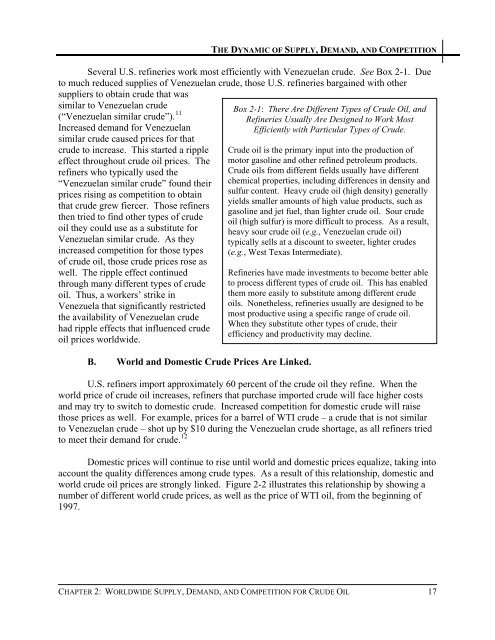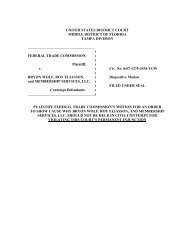Gasoline Price Changes - Federal Trade Commission
Gasoline Price Changes - Federal Trade Commission
Gasoline Price Changes - Federal Trade Commission
You also want an ePaper? Increase the reach of your titles
YUMPU automatically turns print PDFs into web optimized ePapers that Google loves.
THE DYNAMIC OF SUPPLY, DEMAND, AND COMPETITION<br />
Several U.S. refineries work most efficiently with Venezuelan crude. See Box 2-1. Due<br />
to much reduced supplies of Venezuelan crude, those U.S. refineries bargained with other<br />
suppliers to obtain crude that was<br />
similar to Venezuelan crude<br />
(“Venezuelan similar crude”). 11<br />
Increased demand for Venezuelan<br />
similar crude caused prices for that<br />
crude to increase. This started a ripple<br />
effect throughout crude oil prices. The<br />
refiners who typically used the<br />
“Venezuelan similar crude” found their<br />
prices rising as competition to obtain<br />
that crude grew fiercer. Those refiners<br />
then tried to find other types of crude<br />
oil they could use as a substitute for<br />
Venezuelan similar crude. As they<br />
increased competition for those types<br />
of crude oil, those crude prices rose as<br />
well. The ripple effect continued<br />
through many different types of crude<br />
oil. Thus, a workers’ strike in<br />
Venezuela that significantly restricted<br />
the availability of Venezuelan crude<br />
had ripple effects that influenced crude<br />
oil prices worldwide.<br />
B. World and Domestic Crude <strong>Price</strong>s Are Linked.<br />
Box 2-1: There Are Different Types of Crude Oil, and<br />
Refineries Usually Are Designed to Work Most<br />
Efficiently with Particular Types of Crude.<br />
Crude oil is the primary input into the production of<br />
motor gasoline and other refined petroleum products.<br />
Crude oils from different fields usually have different<br />
chemical properties, including differences in density and<br />
sulfur content. Heavy crude oil (high density) generally<br />
yields smaller amounts of high value products, such as<br />
gasoline and jet fuel, than lighter crude oil. Sour crude<br />
oil (high sulfur) is more difficult to process. As a result,<br />
heavy sour crude oil (e.g., Venezuelan crude oil)<br />
typically sells at a discount to sweeter, lighter crudes<br />
(e.g., West Texas Intermediate).<br />
Refineries have made investments to become better able<br />
to process different types of crude oil. This has enabled<br />
them more easily to substitute among different crude<br />
oils. Nonetheless, refineries usually are designed to be<br />
most productive using a specific range of crude oil.<br />
When they substitute other types of crude, their<br />
efficiency and productivity may decline.<br />
U.S. refiners import approximately 60 percent of the crude oil they refine. When the<br />
world price of crude oil increases, refiners that purchase imported crude will face higher costs<br />
and may try to switch to domestic crude. Increased competition for domestic crude will raise<br />
those prices as well. For example, prices for a barrel of WTI crude – a crude that is not similar<br />
to Venezuelan crude – shot up by $10 during the Venezuelan crude shortage, as all refiners tried<br />
to meet their demand for crude. 12<br />
Domestic prices will continue to rise until world and domestic prices equalize, taking into<br />
account the quality differences among crude types. As a result of this relationship, domestic and<br />
world crude oil prices are strongly linked. Figure 2-2 illustrates this relationship by showing a<br />
number of different world crude prices, as well as the price of WTI oil, from the beginning of<br />
1997.<br />
CHAPTER 2: WORLDWIDE SUPPLY, DEMAND, AND COMPETITION FOR CRUDE OIL 17
















